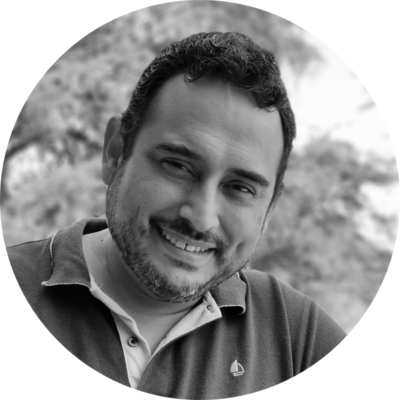
Mauricio is a seasoned professional, bringing 25 years of experience to his current role as Quality and Commercialization Manager at Future of Fish Peru. Much of his professional experiences have been focused on leading and coordinating activities within the public sector. This includes 10 years as the head of PROMPERU’s north regional office, overseeing the exportation of products originating from Tumbes and Piura. Mauricio earned his master’s degree in ecotourism from the National Agrarian University, located in La Molina, Peru.
How did you find your way into marine issues?
I was born in Lima, a coastal city with many beaches. Sometimes I went with my family and friends to spend the summer and fish. I also camped with the Scouts and went canoeing in Ancón, a seaside resort north of Lima. When I was studying for my master’s degree in ecotourism at UNALM, we visited fishing communities in the mangroves of Tumbes that extracted black mollusks. In addition to touring the beaches, I was able to analyze the carrying capacity of “Isla Foca,” a marine refuge in La Islilla, while living in Piura. During my previous tenure as head of the PROMPERU office, I was able to visit not only the fish processing plants, heavily concentrated in squid and mahi-mahi, but also to visit the scallop extraction areas in Sechura, shrimp farms in Tumbes, and trout farms in the Andes.
Where do you hope global fish production will be in 5 years? 10 years?
If we do not take action to increase the responsible consumption of fish and shellfish —at the very least, becoming consumers who are informed on the origin of our seafood and when seasonal closures are in effect — such public disinterest in environmental, labor, and social issues, may cause the disappearance of some species from the sea. This in turn could have negative ripple effects on the livelihood of several fishing communities and over time, increase the temperature of the sea and the availability of ocean-based foods.
How do you see your previous experience coming into play at Future of Fish?
Through my contribution to the building of connections between public and private actors that improves the quality of fishing operations, the implementation of sustainable businesses, and the organizational strengthening of the community.
What most attracted you to working with Future of Fish?
The organizational mission is interested in the social wellbeing of those involved in fisheries work and not exclusively on the environmental side of fishing matters. The diversity among the staff who bring differing fisheries expertise and other subject matter specialties. The high level of professionalism among our staff. Their commitment to quality improvement, technology transfer, and providing access to valuable information. As a previous consultant, I had met some of the FoF staff in Peru and was able to assess the quality type of people that they are. Very wonderful people indeed.
What are you most looking forward to doing in the next year?
I would like to see a community organization in Peru that is able to receive, analyze, and implement business proposals, all while in accordance with government regulations. I also hope that over time, such organizations would gain the ability to negotiate their production in technical terms that are informed by quality indicators instead of transactions based exclusively on price and volume.
What do you enjoy doing when you are not working?
I enjoy spending time with my family. With my wife, we sing karaoke every Saturday and we watch TV series together. With my daughter, we play, talk and go shopping. I like to read across genres, especially enjoying mysteries, social studies, and even some philosophy. Lastly, I like watching historical movies and science fiction.
Published Nov 15, 2021




